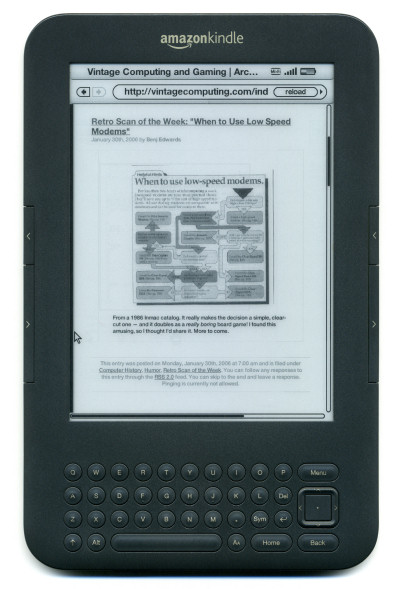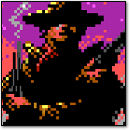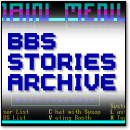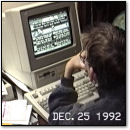[ Retro Scan of the Week ] Number 300
August 15th, 2011 by Benj Edwards Bet you’ve never scanned a website before.
Bet you’ve never scanned a website before.
This week’s Retro Scan happens to be the 300th entry of this series that I’ve posted since 2006. We already celebrated the 5th anniversary of RSTOW back in January, so this isn’t quite as exciting of a milestone.
Still, I thought I’d take this opportunity to do something once thought impossible: I scanned the Vintage Computing and Gaming website. More specifically, I scanned an Amazon Kindle showing the very first Retro Scan of the Week post from back in January 2006.
Did I scan something retro? Not really, but I have the feeling that this Kindle, with its monochrome e-paper screen, will seem very quaint in just a few years. The 2006 RSOTW post itself is already over five years old, which feels like an eternity in Internet time.
Will there be 300 more Retro Scans? Only time will tell.
Discussion Topic of the Week: Do you think e-readers will permanently replace paper books? If so, how soon?






August 15th, 2011 at 5:09 pm
“…I have the feeling that this Kindle, with its monochrome e-paper screen, will seem very quaint in just a few years…”
It already is quaint when compared to the iPad!
August 15th, 2011 at 5:33 pm
I think this is a very complex sociological question. My answer is, I hope not. Yes, technology as we know it is fairly ubiquitous–just look at the adoption of cell phones. Do you know anybody who doesn’t have one? Probably not, but by virtue of the fact that you’re reading this, you run in circles that have access to technology, especially if you follow this blog.
Those not so fortunate should not get cut off from the basic ability to go to a bookshop or a library and read a book. Now, the bookshops are largely online–not that I’m lamenting that, I’m a contributor, and that’s the way the economy goes. I suppose libraries, if they continue to exist, will evolve to providing increasingly cheap e-readers and terminals so everybody has access to published material, in fact even more of it than ever. Maybe that is a good thing, after all. Folks could check out a reader, if need be, or they could get so cheap you could pick one up at the supermarket checkout, and go to the library to borrow content.
I may have talked myself out of the counter-argument. But whether or not it’s a good idea, I do think e-readers will replace dead-tree publishing, but it will take another generation or two. To be blunt, those of us who grew up with paper and might object will have to start dying off, and the young-uns who have never done anything differently will wield the power to shape the future.
August 15th, 2011 at 6:31 pm
I doubt it’s going to happen any time soon. Maybe when the colony ships leave earth and there is no room to bring such frivolous items such as books, then they will be permanently replaced.
August 15th, 2011 at 8:48 pm
I have a tablet, which I’ve used to read several books. It’s a decent experience, and I can carry more books than I could have prior, but I miss the tactile experience of a real book. Plus, I cannot use my finger to keep my place without usually accidentally flipping the page. I think many other people probably have the same problem, unless they use a non-touch screen e-reader.
August 16th, 2011 at 4:00 am
@Paul Jenkins — Except that the iPad isn’t an ebook reader, it’s a color tablet that includes an ebook reading function. An ebook reader uses a non-backlit display that only refreshes when the user flips a page, so that it’s functionally no different from staring at a piece of paper. Devices like the iPad use backlit LCDs or similar rapid-refresh screen, which is harder on the human eye (though there’s rare people that don’t feel the eyestrain) and, if one has a light-sensitive headache, physically painful.
Anyway, back to the proper topic… I could be wrong, but I’m guessing that back in the 1950s or thereabouts, a similar conversation was probably raging in private about paperbacks vs. hardcovers. I think that what will happen will parallel the shift that happened back then — except in our case, our inexpensive option will be e-books (though as we’re already seeing, they won’t have the same cost savings as paperbacks did relative to hardcovers back then), then physical books will be $5-50 more expensive based on the quality/type of paper, cover, and so forth.
The frustrating thing is that there probably won’t be any changes to DRM, author royalties (they deserve a much higher %), file formats, price of ebooks relative to paperback/hardcover, and so forth. People would have to refrain from buying from publishers that didn’t treat readers & writers well enough first, and for many reasons, not enough are likely to take that kind of step to have an effect.
August 16th, 2011 at 12:02 pm
I could not read the flow chart, the words were too small and blurry! How am I going to know when to use a…what was it? A low speed modem?
August 17th, 2011 at 8:42 am
I agree with Donn’s assessment regarding the future of our library system and that this change is coming as part of a generational shift. I speak with some of the younger techs in my office and their reading preferences are for online content. With social networks such as Twitter, Facebook and of course the advent of blogging some years ago, the paradigm shift from newspaper, book or letter for that matter, to digital reading has already begun. It almost seems inevitable that penmanship will be left to artists and designers and will become obsolete to the masses. I recently bought a nook and I love it, though it occurs to me that someday these e-readers will be paper thin. I also like the feel of a book in my hands and that in my opinion will eventually become a novelty left to collectors.
August 17th, 2011 at 10:12 am
Great comments, guys. Since buying a Kindle only last December, I have already switched entirely to reading long-form books on that device (or on an iPad or iPod Touch, depending on the circumstance). I think the extinction of mainstream paper books is closer than most people think. I give them 10-15 years at most.
A major factor in the extinction of paper books will be a future $5-$10 e-reader that anyone can afford and use without an umbilical to a computer. A little later, e-readers and e-paper will become so cheap as to be nearly disposable (that’s probably 15-20 years away, but who knows — it could happen much sooner).
Imagine buying a flexible, full-color e-paper magazine the same size and shape as a paper magazine. You’d only need to buy one and could download new content to fill it as many times as you’d like. They’d be so cheap that you could buy many of them or even throw them away if necessary. They might even be able to play high quality video.
Imagine a framed, paper-thin e-paper picture on your wall with the same fidelity as photo paper that you can change wirelessly any time you want.
Imagine e-paper sheets the same size as letter-sized printer paper. You could “print” to them wirelessly, cut them up, or re-use them.
I believe that is coming.
August 31st, 2011 at 8:10 am
‘It already is quaint when compared to the iPad!’
Gees, there’s always one…
You do know the ipad isn’t an e-reader, right?
E-paper technology is generally what makes dedicated e-reader hardware.
I assume the poster was referring to the (apparent) advent of proper coloured e-paper machines, and not just colour LCD devices calling themselves e-readers. No this isn’t a jibe at the iPad.
The iPad was never intended to be compared like-for-like in the e-reader market. It isn’t an e-reader it’s a tablet-computer. Big difference!
August 31st, 2011 at 8:24 am
Oh, and to answer the question, no I can never see e-readers taking over from paper books. We have two dedicated e-readers in our house. My wife has a kindle and I have one of the original pocket sized Sony machines … er. In my pocket as I type this. I’ve discussed this on forums before, and I think there are already two distinct camps on this issue. I posted a couple of articles touching on this back in March on my writing blog at http://g2writing.blogspot.com/ (Ooops, sorry… was that a shameful plug?)